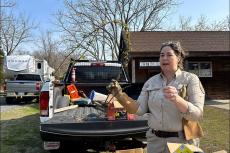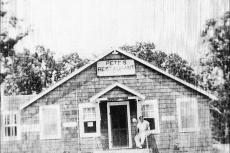Anthony Lombardo was in the Army in 1952, stationed in Germany and sitting in a restaurant with a friend, when they overheard the people at the next table discussing Verdi’s “Otello.”
Mr. Lombardo, who was 87 on Nov. 23, remembers it well. “I never felt stupid in my life,” he said, “but — opera? Shakespeare? And I said, ‘What are they talking about?’ And my friend said, ‘Aah, they’re just being pedantic.’ And I said, ‘What’s that mean?’ ”
He went back to barracks and right then made a decision. “I said, I’m going to college, I’m going to be intellectual, I’m going to listen to music like the rich people do.”
College didn’t happen, but Mr. Lombardo is nothing if not a quick study. During a lively conversation at the East Hampton Town Senior Citizens Center, he said he’d taught himself Morse code “before I became a Boy Scout,” and over his long life, what with one thing and another — maybe make that one and another girlfriend — he’s picked up Spanish, German, Italian, and French, starting back at Seward Park High School on the Lower East Side. She was Puerto Rican, he remembered, smiling, and would take him to parties and dance halls where no one spoke English.
Then, in Germany, “We’d treat the girls to beer and schnitzel once a month. One girl kept hitting — is that the word? — on me. The German girl I dated — more than dated, I grew up there, as a man — we would go see plays in German, and I really felt I wanted to understand.”
They were together for almost a year. By the time they broke up, he’d become fluent in High German. “She spoke it like a crystal chandelier.”
French, he taught himself. “Once you speak German, Italian, and Spanish, French is a piece of cake.”
If he doesn’t have a doctor’s appointment or is away from town for one or another reason, Mr. Lombardo stands up on Mondays after lunch at the senior center before an eager audience of six or eight and plays for them one of the operas from his collection, which now numbers over 100 — on vinyl, VHS, DVD, CD, tape, what have you. (He is recovering from a recent stroke; before it happened, he would hold these Monday presentations like clockwork. Lately, it’sbeen a bit hit or miss. He also invites people to hear and/or see opera on Wednesday nights at his East Hampton apartment, and makes them a pot of pasta to top off the occasion.)
Over the phone, he gave an example of what he might say to them beforehand, rattling off, in Italian, the villainous Scarpio’s aria “Gie, mi dicon venal” (“Yes, they say I am venal”) to the beautiful Tosca. “Then I tell them what it means, and why it’s important.”
The first opera he ever owned, Puccini’s “Madama Butterfly,” was a birthday present soon after his Army discharge. “It was in a box. I didn’t open it right away. I didn’t know opera yet, and at the time I spoke only Spanish and German.” There was a book inside, though, with a translation of the Italian libretto, and eventually he read it, and listened to the LP records.
“I cried all through. Out of the vinyl, came the acting.”
He went out to buy another. “The expensive records were on the Angel label. I bought ‘Lucia di Lammermoor,’ with Callas, and I could picture everything. I was hooked.”
Born in Sicily and brought to New York soon after he could walk, Mr. Lombardo never learned to speak his native language until opera came along. His family, friends, and relatives “all spoke broken English,” he said, the faster to embrace the new country. “My father was a bricklayer. Every Friday night he and his friends would go out drinking. They’d all get drunk, and one Friday they all went and joined the Army together. He loved America.”
After leaving the service, Mr. Lombardo lost little time making good on his promises to himself. With a thirst for knowledge and a talent for drawing, he took classes to learn to be a draftsman. His language skills stood him in good stead. Hired by a Manhattan furniture company, he started out by making detailed illustrations for cabinetmakers to follow.
“The subcontracting cabinetmakers loved me and loved that I spoke Italian. The painters were Puerto Rican; we spoke Spanish. The upholsterer was an Ashkenazi Jew. He spoke German. When we met I spoke to him in High German, and he hugged me!”
After a while, he said, he fell in with a decorator who introduced him around to higher-ups in the various trades, and he became a designer of fine furniture — tables, chairs, cabinetry, bedroom sets, on up to entire paneled rooms and even, for the New York developer Sol Goldman, the lobbies of buildings. (“His son and I became good friends. We both like [the Spanish pianist] Alicia de Larrocha.”)
Lombardo designs “took off like wildfire” — examples can still be seen on Google — and the young soldier who’d promised himself he’d be rich someday wound up owning a company or two of his own and building a house in Amagansett. Over the years, he had two marriages, two daughters, and two divorces.
“All the psychiatrists, doctors, dentists — paid in cash,” he said, “and with the cash, I won over $40,000 at the track. Two years in a row. My clothes were made by Oleg Cassini. I never did a room for less than $100,000.”
“When I got a computer, I got more operas. Now I’m getting some not-too-popular ones, ‘Faust,’ ‘The Flying Dutchman,’ and some biblical ones I didn’t know — ‘Nabucco,’ ‘Samson and Delilah.’ ”
About 30 years ago, Mr. Lombardo became a patron of the Metropolitan Opera. “I wore a tuxedo when I’d go to the Met openings,” he said.
Then in 2003 came the war in Iraq. “I had two companies, I was making lots of money. But when there’s a war, the rich people buy nothing luxury, no fancy clothes. They only buy gold. So, half the carpet people, the fabric people, everyone in the D&D Building went out of business.”
“I was running out of money. I sold my antique cars. I kept refinancing the house. Now I’m at the end of my rope. Where am I going to live?”
Then he heard about Windmill Village, East Hampton Town’s first affordable housing complex. In 2009, his application was approved.
Now, Mr. Lombardo drives a 1995 Cadillac Fleetwood, his last remaining car. The license plate says OPERACAR, and when he goes to see The Met in HD operas at Guild Hall, “they make sure I get a parking spot.”




